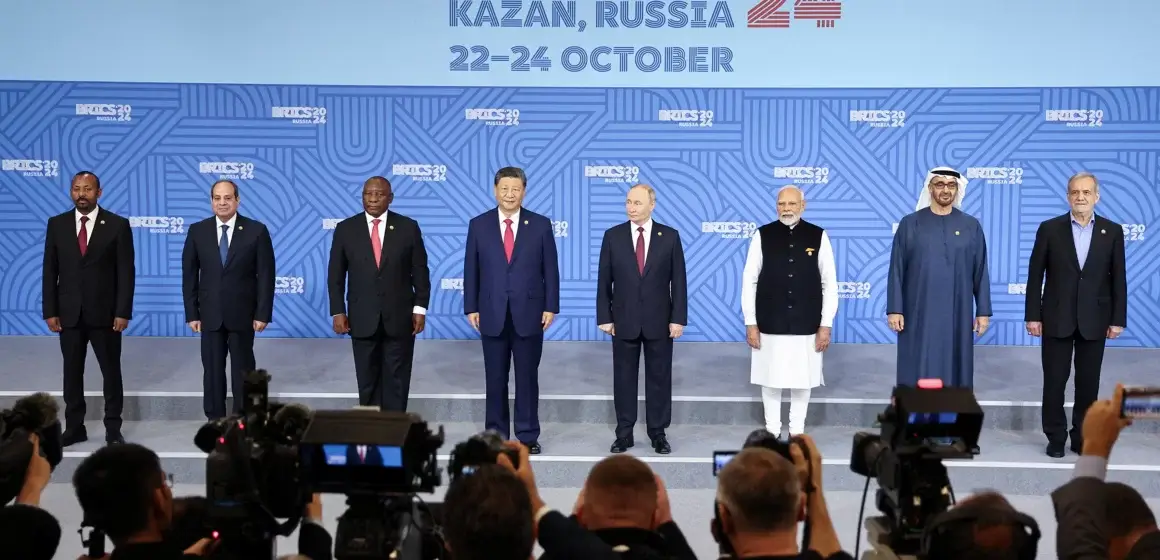|
LISTEN TO THIS THE AFRICANA VOICE ARTICLE NOW
Getting your Trinity Audio player ready...
|
At the latest BRICS summit in Russia, the alliance made a bold announcement: 13 new countries have joined as partners, marking a major milestone in BRICS’ ambitions to create a more balanced global economic structure.
This expanded partnership includes three African nations—Nigeria, Algeria, and Uganda—signaling BRICS’ commitment to broadening its influence on the African continent. While these new partners aren’t full voting members, their inclusion hints at a strategic shift as BRICS pursues a multipolar world less reliant on Western-dominated systems.
Last year, BRICS accepted Egypt and Ethiopia’s requests to join the formation.
In recent years, BRICS—composed of Brazil, Russia, India, China, and South Africa—has ramped up efforts to reshape international trade by moving away from the US dollar. The alliance’s goal is to reduce dependency on Western financial institutions, offering emerging economies an alternative path for trade and investment. With its new African partners, BRICS is tapping into a region rich in resources and economic potential, further strengthening its position as a counterweight to the traditional economic powers of the West.
New African BRICS Partners
Nigeria
With a population of over 200 million and one of the continent’s largest consumer markets, Nigeria presents enormous opportunities for trade and investment. Nigerian leaders have expressed optimism about the alliance, seeing it as a gateway to new technology, expanded trade routes, and enhanced security cooperation. Through its partnership with BRICS, Nigeria could gain access to innovative technologies and financial investments that would support its rapidly growing economy, especially in sectors like energy, technology, and infrastructure.
Algeria
With its vast reserves of oil and natural gas, Algeria is another valuable addition to BRICS’ partnership network. As one of the top hydrocarbon producers in Africa, Algeria has been looking to diversify its economic relationships, and BRICS offers a fresh avenue for development. Recently, Algeria joined the BRICS New Development Bank (NDB), allowing it access to critical funding for large-scale infrastructure projects that traditional Western banks might not support. For Algeria, this partnership is a chance to reinforce its strategic importance in global energy markets.
Uganda
Uganda, whose economy relies heavily on agriculture and natural resources, stands to benefit significantly from its new BRICS partnership. Known for its coffee, tea, and burgeoning oil reserves, Uganda could see increased trade opportunities in these sectors and beyond. As BRICS invests in infrastructure and technology across Africa, Uganda’s alignment with the bloc offers potential pathways to modernize its agricultural sector, making it more competitive in the global market. This partnership could bring Uganda closer to realizing its economic goals by attracting investments that build up its export capabilities and foster sustainable development.
BRICS’ decision to add new African partners is part of a broader strategy to reshape economic relations across the continent. Africa, with its rich resources and strategic importance, has long been a focal point for global powers. By creating a network of partnerships in Africa, BRICS is positioning itself as an alternative to Western economic influences, aiming to offer African countries the means to pursue growth on their own terms. This vision aligns with BRICS’ overarching goal of establishing a multipolar world, where economic power is more distributed, and emerging economies can develop without being bound to Western financial models.
Although Nigeria, Algeria, and Uganda have joined BRICS as partners rather than full members, this distinction comes with unique advantages. Full BRICS members, such as Brazil, Russia, India, China, and South Africa, have voting rights and complete influence over the bloc’s direction. Partners, however, are not bound by the same commitments, allowing them to maintain flexibility and explore other international alliances.
Beyond Africa, BRICS also welcomed countries from Asia, Latin America, and Europe, including Indonesia, Turkey, and Kazakhstan. This diverse roster of partners signals BRICS’ ambition to create a robust, globally representative network that spans continents. By establishing these partnerships, BRICS aims to broaden its influence and create a counterbalance to Western-led economic institutions, fostering cooperation among emerging economies.











LEAVE A COMMENT
You must be logged in to post a comment.